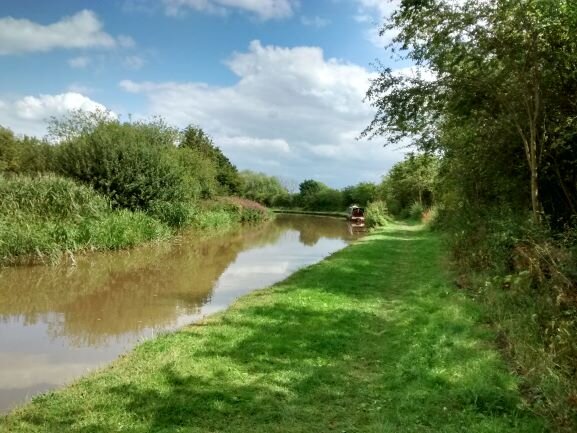May Blogging: Pilgrim Ways
It’s maybe fitting that this May blog is being posted in early June. Pilgrimage can both slow us down in some way – taking the footpath rather than the highway – but also be about arriving in the end. So, a little more slowly than usual, the May blog on Pilgrimage is here in the end.
Throughout these months of Spring to Summer 2021, RHC thoughts have been with Pilgrimage. We’re not alone in that; pilgrim paths are popular again, with old paths being resurrected, new paths being established, and more pilgrims making their way. We’re paying attention to it at RHC in the here and now because Pilgrimage seems to be able both to speak deeply to our pandemic experiences and also, more light-heartedly, to help us travel imaginatively when travelling physically is problematic.
The pilgrim path is both confined and open. Following a pilgrim way – from, say, London to Canterbury, or more locally from Chester to Lichfield (or vice versa) on the Two Saints Way – means following a defined path, a route trodden by others. In some ways, there’s a similarity it seems with what we’ve all been doing following the restrictions of Covid: the way is defined for us, and we walk it alongside others. There’s a difference, though, in that the destination of a pilgrimage is known as you set out, whereas for much of the last eighteen months or so it has felt like our destination is uncertain. Where are we heading, we have wondered. When will we get there?
But the key to pilgrimage is that really, deep down, we don’t know where we are heading. Geographically we do, but what about spiritually, emotionally, physically? In these ways, pilgrimage becomes an open road, trodden by others, yes, but also unique to each traveller. What are my own reserves, my own discoveries? How will I be changed? Perhaps these questions are no less relevant as we have made our way (by staying put) through Covid times.
wise words on The Two Saints Way
Even when we are living with physical restrictions, as we all have been, we are able to travel with our imagination. So for RHC Book Club we have just read ‘The Extra Mile: a 21st Century Pilgrimage’ by Peter Stanford (not to be confused with ‘Pilgrimage: Journeys of Meaning’, by the same author and just published). This book, says the author’s website, is ‘a modern-day pilgrimage round eight of Britain's ancient religious sites, … taking the spiritual temperature of our apparently secular and sceptical age’. So while staying at home we’ve been transported through reading to such places as Iona, Bardsey Island, Glastonbury and Lindisfarne, in the company of the mixed bunch of very modern pilgrims Stanford encounters along the way and whose ‘emotion, independence, democracy and innovation’ he ends up appreciating.
Running through the book, and the theme of Pilgrimage, is a sense of how distracted we can be by the demands and diversions of everyday life – and how making a journey to these ancient sites and ‘being present’ there can enable us to slow down so that ‘I can feel a space beginning to open up inside me’ (Stanford, on the journey to Iona). In some small way, sitting down to read a chapter about, say, Iona can also enable that. Without movement of physical travel, we can still be moved. We can be ‘transported’ by something that invites our attention – a book, art, music, film, a hobby, time with another person, meditation, prayer. It’s an inner journey, a journey of the imagination, or the heart, or the soul, opening us up.
Pilgrimage isn’t about standing still. Slowly, as a society if not as a world community, we are moving with the easing of lockdown (at least, at the time of writing…). Pilgrimage can teach us to remember where we have been, and to notice what happens along the way, and return to our ‘normal’ places knowing that we have been changed. This kind of thoughtful and reflective attitude seems important as we move on from the last eighteen months. Finding ourselves again in pub gardens, in the company of others, inside buildings, in ‘the office’, do we just forget the path we’ve been on and the things we’ve experienced along the way, as if it didn’t happen? Both the things that have been almost unbearably hard, and the treasures we may have discovered too: do we ignore them or do we do something with them?
up or down - on the Two Saints Way
Pilgrims are known for their tales. One of our oldest English works of literature is Chaucer’s ‘Canterbury Tales’, a medieval collection of imagined stories told by the individuals in a group of pilgrims making their way together from London to Canterbury. Through our RHC Tuesday Conversations, we have been exploring aspects of Pilgrimage and in doing so we discover and tell something of our own stories. Some of this conversation touches on our pandemic experiences. Alongside loneliness, fear, uncertainty and doubt, there are tales of patience, gratitude, noticing, resilience, trust. Sharing tales of the ground on which we walk – both the speaking and the listening – is a treasured part of Pilgrimage. Each with our own tale, we discover that we are companions nonetheless.
None of us knows for sure what is happening for our world, our society, ourselves. But how we travel matters, and what we do with what we have learnt and experienced along the way matters too. The ancient practice of Pilgrimage can still remind us of this as we make our way into the second half of 2021. The British Pilgrimage Trust suggests that a pilgrimage is a walk with an ‘intention’ – ‘dedicate your journey to something you want help with, or for which you want to give thanks’, they say. Or, in the months ahead, maybe both.
two ways on the Two Saints Way




